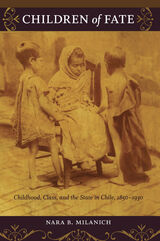
Milanich pays particular attention to family law, arguing that liberal legal reforms wrought in the 1850s, which left the paternity of illegitimate children purposely unrecorded, reinforced not only patriarchal power but also hierarchies of class. Through vivid stories culled from judicial and notarial sources and from a cache of documents found in the closet of a Santiago orphanage, she reveals how law and bureaucracy helped create an anonymous underclass bereft of kin entitlements, dependent on the charity of others, and marginalized from public bureaucracies. Milanich also challenges the recent scholarly emphasis on state formation by highlighting the enduring importance of private, informal, and extralegal relations of power within and across households. Children of Fate demonstrates how the study of children can illuminate the social organization of gender and class, liberalism, law, and state power in modern Latin America.
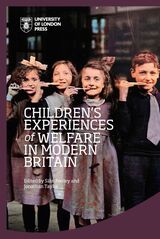
Children’s Experiences of Welfare in Modern Britain demonstrates how the young have been integral to the creation, delivery, and impact of welfare. The book brings together the very latest research on welfare as provided by the state, charities, and families in nineteenth- and twentieth-century Britain. The ten chapters consider a wide range of investments in young people’s lives, including residential institutions, Commonwealth emigration schemes, hospitals and clinics, schools, social housing, and familial care. Drawing upon thousands of personal testimonies and oral histories—including a wealth of writing by children themselves—the book shows that we can only understand the history and impact of welfare if we listen to children’s experiences.
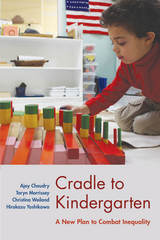
The U.S. government invests less in children under the age of five than do most other developed nations. Most working families must seek private childcare, which means that children from low-income households, who would benefit most from high-quality early education, are the least likely to attend them. Existing policies, such as pre-kindergarten in some states are only partial solutions. To address these deficiencies, the authors propose to overhaul the early care system, beginning with a federal paid parental leave policy that provides both mothers and fathers with time and financial support after the birth of a child. They also advocate increased public benefits, including an expansion of the child care tax credit, and a new child care assurance program that subsidizes the cost of early care for low- and moderate-income families. They also propose that universal, high-quality early education in the states should start by age three, and a reform of the Head Start program that would include more intensive services for families living in areas of concentrated poverty and experiencing multiple adversities from the earliest point in these most disadvantaged children’s lives. They conclude with an implementation plan and contend that these reforms are attainable within a ten-year timeline.
Reducing educational and economic inequalities requires that all children have robust opportunities to learn, fully develop their capacities, and have a fair shot at success. Cradle to Kindergarten presents a blueprint for fulfilling this promise by expanding access to educational and financial resources at a critical stage of child development.
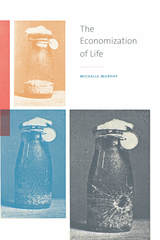
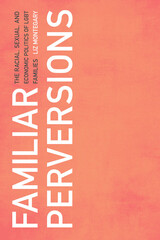
Over the past two decades, same-sex couples raising children have become more visible within US political and popular culture. Thanks to widely circulated images of well-mannered, well-dressed, and well-off two-parent families, a select number of LGBT-identified parents have gained recognition as model American citizens. In Familiar Perversions, Liz Montegary shows how this seemingly progressive view of same-sex parenting has taken shape during a period of growing racial inequality and economic insecurity in the United States. This book evaluates the recent successes of the “family equality” movement, while asking important questions about its relationship to neoliberalism, the policing of sexual cultures, and the broader context of social justice organizing at the turn of the twenty-first century.
Montegary’s investigation of the politics of LGBT family life takes us on a journey that includes not only activist events and the courtrooms where landmark decisions about same-sex families were made, but also parenting workshops, cruise ships, and gay resort towns. Through its sustained historical analysis, Familiar Perversions lays critical groundwork for imagining a queer family movement that can support and strengthen the diverse networks of care, kinship, and intimacy on which our collective survival depends.

Too many American families—unstable, broken, often poor—are in serious peril, and both the reality of the situation and the myths obscuring that reality call for attention and swift action. In this most incisive analysis of the parlous state of the family today, Marian Wright Edelman, President of the Children’s Defense Fund, charts what is happening, exposes myths, and sets a bold agenda to strengthen families and protect children. In brilliant strokes and with abundant detail, Edelman describes family conditions over a generation—the rising curve of teenage pregnancy, the overwhelming joblessness of young blacks, the trend toward single-parent households, the increase in hungry and neglected children.
Dispelling common assumptions about these bleak phenomena, she shows that the birth rate for black unmarried women is stabilizing while that for unmarried whites continues to rise, that Aid to Dependent Children does not cause teenage pregnancy or births, and that the child poverty rate has increased two-thirds for whites in recent years, as opposed to one-sixth for black children. Overall, whites are losing ground faster than blacks. Speaking for a growing number of social commentators, she finds the key to explain the rising proportion of births to single black mothers: a lost generation of fathers—young black males unable to marry and support a family, jobless from lack of education and training.
What can be done? Edelman links the family and child poverty crisis to the fragile and ephemeral commitment of government to assist the needy. She suggests establishing a partnership between government, the private sector, and the black community to ensure children food, clothing, housing, medical care, and education. “Preventive investment strategies”—providing health, nutrition, and child care, raising the minimum wage, preventing teenage pregnancies, and opening up educational and employment opportunities for heads of families—will benefit us all. A passionate call to act now, to give real meaning to traditional American instincts for decency, this book is essential reading for everyone committed to preserving the nation’s future.

In the wake of vast social and economic changes, the nuclear family has lost its dominance, both as an ideal and in practice. Some welcome this shift, while others see civilization itself in peril—but few move beyond ideology to develop a nuanced understanding of how families function in society. In this provocative book, Margaret F. Brinig draws on research from a variety of disciplines to offer a distinctive study of family dynamics and social policy.
Concentrating on legal reform, Brinig examines a range of subjects, including cohabitation, custody, grandparent visitation, and domestic violence. She concludes that conventional legal reforms and the social programs they engender ignore social capital: the trust and support given to families by a community. Traditional families generate much more social capital than nontraditional ones, Brinig concludes, which leads to clear rewards for the children. Firmly grounded in empirical research, Family, Law, and Community argues that family policy can only be effective if it is guided by an understanding of the importance of social capital and the advantages held by families that accrue it.
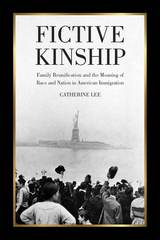
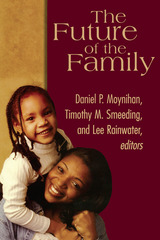
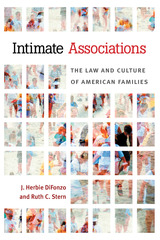
The rise in divorce, cohabitation, single parenthood, and same-sex partnerships, along with an increase in surrogacy, adoption, and assisted reproductive technologies, has led to many diverse configurations of families, or intimate associations. J. Herbie DiFonzo and Ruth C. Stern chart these trends over the past several decades and investigate their social, legal, and economic implications.
Drawing upon a wealth of social science data, they show that, by a number of measures, children of married parents fare better than children in a household formed by cohabiting adults. This is not to condemn nontraditional families, but to point out that society and the law do not yet adequately provide for their needs. The authors applaud the ways in which courts and legislatures are beginning to replace rigid concepts of marriage and parenthood with the more flexible concept of “functional” family roles. In the conclusion, they call for a legal system that can adapt to the continually changing reality of family life.
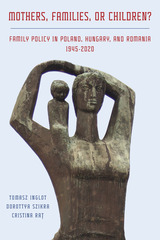
Mothers, Families, or Children? is the first comparative-historical study of family policies in Poland, Hungary, and Romania from 1945 until the eve of the global pandemic in 2020. The book highlights the emergence, consolidation, and perseverance of three types of family policies based on “mother-orientation” in Poland, “family orientation” in Hungary, and “child-orientation” in Romania. It uses a new theoretical framework to identify core and contingent clusters of benefits and services in each country and trace their development across time and under different political regimes, before and after 1989. It also examines and compares policy continuity and change with special attention to institutions, ideas, and actors involved in decision making and reform. As family policies continue to evolve in the era of European Union membership and new governmental and societal actors emerge, this study reveals mechanisms that help preserve core family policy clusters while allowing reform in contingent ones in each country.
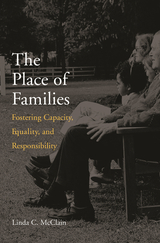
In this bold new book, Linda McClain offers a liberal and feminist theory of the relationships between family life and politics--a topic dominated by conservative thinkers. McClain agrees that stable family lives are vital to forming persons into capable, responsible, self-governing citizens. But what are the public values at stake when we think about families, and what sorts of families should government recognize and promote?
Arguing that family life helps create the virtues and character required for citizenship, McClain shows that the connection between family self-government and democratic self-government does not require the deep-laid gender inequality that has historically accompanied it. Examining controversial issues in family law and policy--among them, the governmental promotion of heterosexual marriage and the denial of marriage to same-sex couples, the regulation of family life through welfare policy, and constitutional rights to reproductive freedom--McClain argues for a political theory of the family that embraces equality, defends rights as facilitating responsibility, and supports families in ways that respect men's and women's capacities for self-government.

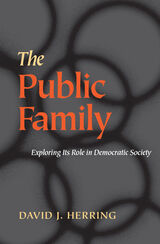
Those concerned with investigating the political functions of the family far too often identify only one: the production of “good democratic citizens.” As a result, public discussion of family law and policy has been confined to a narrow continuum that ignores the family's other, often subversive, political functions.
In The Public Family David Herring's goal is to create a new rhetoric that moves beyond the stalemate that often results from the war between advocates of parental rights and those of children's rights. This “rhetoric of associational respect” allows him to constructively address the role of rights and the limits of individualism in political and legal theory.
While acknowledging the family's importance in facilitating state functioning and power in a large, pluralistic democracy (the aforementioned production of good citizens), Herring fully explores the ways in which the family produces diversity and promotes tolerance. Unlike other works on the subject, which view the differences between individuals as constituting the central challenge for American society, Herring focuses on the importance of such differences. In doing so, he enriches and enlivens the often divisive public discussion of family law and policy.
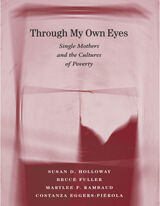
Shirl is a single mother who urges her son's baby-sitter to swat him when he misbehaves. Helena went back to work to get off welfare, then quit to be with her small daughter. Kathy was making good money but got into cocaine and had to give up her two-year-old son during her rehabilitation. Pundits, politicians, and social critics have plenty to say about such women and their behavior. But in this book, for the first time, we hear what these women have to say for themselves. An eye-opening--and heart-rending--account from the front lines of poverty, Through My Own Eyes offers a firsthand look at how single mothers with the slimmest of resources manage from day to day. We witness their struggles to balance work and motherhood and watch as they negotiate a bewildering maze of child-care and social agencies.
For three years the authors followed the lives of fourteen women from poor Boston neighborhoods, all of whom had young children and had been receiving welfare intermittently. We learn how these women keep their families on firm footing and try--frequently in vain--to gain ground. We hear how they find child-care and what they expect from it, as well as what the childcare providers have to say about serving low-income families. Holloway and Fuller view these lives in the context of family policy issues touching on the disintegration of inner cities, welfare reform, early childhood and "pro-choice" poverty programs.
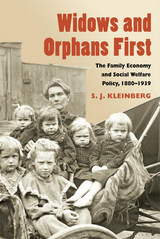
The experiences of widows and their children during the Progressive Era and the New Deal depended on differences in local economies and values. How did these widely varied experiences impact the origins of the welfare state?
S. J. Kleinberg delves into the question by comparing widows' lives in three industrial cities with differing economic, ethnic, and racial bases. Government in Fall River, Massachusetts, saw employment as a solution to widows' poverty and as a result drastically limited public charity. In Pittsburgh, widows received sympathetic treatment. Few jobs existed for them or their children; indeed, the jobs for men were concentrated in "widowmaking" industries like steel and railroading. With a large African American population and a diverse economy that relied on inexpensive child and female labor, Baltimore limited funds for public services. African Americans adapted by establishing their own charitable institutions.
A fascinating comparative study, Widows and Orphans First offers a one-of-a-kind look at social welfare policy for widows and the role of children in society during a pivotal time in American history.
READERS
Browse our collection.
PUBLISHERS
See BiblioVault's publisher services.
STUDENT SERVICES
Files for college accessibility offices.
UChicago Accessibility Resources
home | accessibility | search | about | contact us
BiblioVault ® 2001 - 2024
The University of Chicago Press









